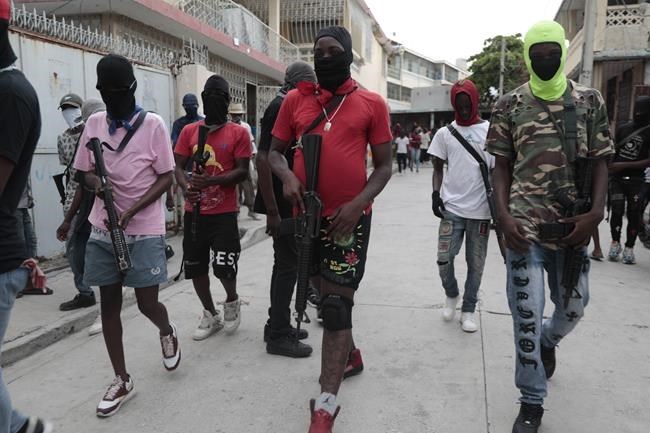SAN JUAN, Puerto Rico (AP) — The U.N. Security Council voted Monday to send a multinational force to Haiti led by Kenya to help combat violent gangs in the troubled Caribbean country.
The resolution drafted by the U.S. was approved with 13 votes in favor and two abstentions from China and the Russia Federation.
The resolution authorizes the force to deploy for one year, with a review after nine months. It would mark the first time a force is deployed to Haiti since a U.N.-approved mission nearly 20 years ago.
“More than just a simple vote, this is in fact an expression of solidarity with a population in distress,” said Jean Victor Généus, Haiti’s foreign affairs minister. “It’s a glimmer of hope for the people who have been suffering for too long.”
A deployment date has not been set, although U.S. Secretary of State Antony Blinken recently said a security mission to Haiti could deploy “in months.”
Meanwhile, Kenya’s Foreign Affairs Minister, Alfred Mutua, told the BBC that the force should already be in Haiti by Jan. 1, 2024, “if not before then.”
It wasn’t immediately clear how big the force would be. Kenya’s government has previously proposed sending 1,000 police officers. In addition, Jamaica, the Bahamas and Antigua and Barbuda also have pledged to send personnel.
“With this action, the council has ignited a beacon of hope for the beleaguered people of Haiti,” said Martin Kimani, Kenya's U.N. representative.
Last month, the administration of U.S. President Joe Biden promised to provide logistics and $100 million to support the Kenyan-led force.
The representative of the Russian Federation, Vassily Nebenzia, said he does not have any objections in principle to the resolution, but said that sending an armed force to a country even at its request “is an extreme measure that must be thought through.”
He said multiple requests for details including the use of force and when it would be withdrawn “went unanswered” and criticized what he said was a rushed decision. “Authorizing another use of force in Haiti … is short-sighted” without the details sought by the Russian Federation, he said.
China’s representative, Zhang Jun, said he hopes countries leading the mission will hold in-depth consultations with Haitian officials on the deployment of the security force, adding that a “legitimate, effective, accountable government” needs to be in place in Haiti for any resolution to have effect.
He also said the resolution does not contain a feasible or credible timetable for the deployment of the force.
Généus, Haiti's foreign affairs minister, said he's grateful the resolution was approved because a foreign armed force is essential but noted that it's “not enough."
“Socioeconomic development must be taken into account to take care of extreme poverty,” he said, adding that it was the source of many of Haiti's problems and has created fertile ground for the recruitment of young people by gangs.
About 60% of Haiti's more than 11 million people earn less than $2 a day, with poverty deepening further in recent years as inflation spikes.
The deployment of an armed force is expected to restore peace and security to Haiti so it also can hold long-awaited general elections that have been repeatedly promised by Prime Minister Ariel Henry after the July 2021 assassination of President Jovenel Moïse.
Haiti lost its last democratically elected institution in January after the terms of 10 remaining senators expired, leaving not a single lawmaker in the country's House or Senate. Meanwhile, Henry has been ruling the country with the backing of the international community.
The president of the U.N. Security Council, Brazil's Sérgio França, noted that without a Haitian political solution based on free, transparent and fair elections, “no aid will guarantee lasting success.”
International intervention in Haiti has a complicated history. A U.N.-approved stabilization mission to Haiti that started in June 2004 was marred by a sexual abuse scandal and the introduction of cholera. The mission ended in October 2017.
Critics of Monday's approved Kenyan-led mission also have noted that police in the east Africa country have long been accused of using torture, deadly force and other abuses. Top Kenyan officials visited Haiti in August as part of a reconnaissance mission as the U.S. worked on a draft of the resolution.
The vote comes nearly a year after Haitian Prime Minister Ariel Henry and 18 top government officials requested the immediate deployment of a foreign armed force as the government struggled to control gangs amid a surge in killings, rapes and kidnappings.
From January 1 until Aug. 15, more than 2,400 people in Haiti were reported killed, more than 950 kidnapped and another 902 injured, according to the most recent U.N. statistics.
Dánica Coto, The Associated Press

